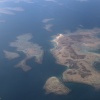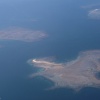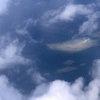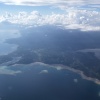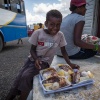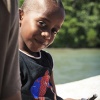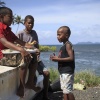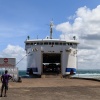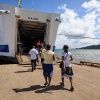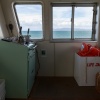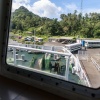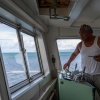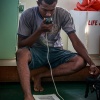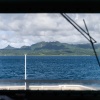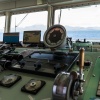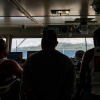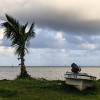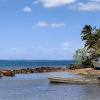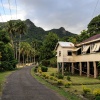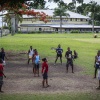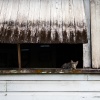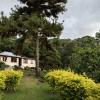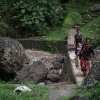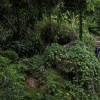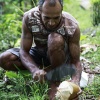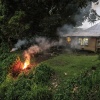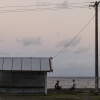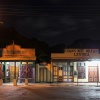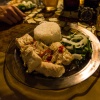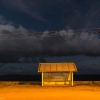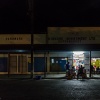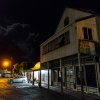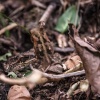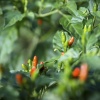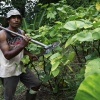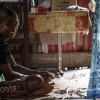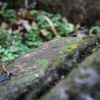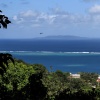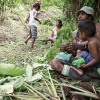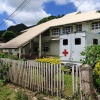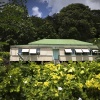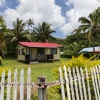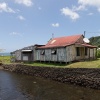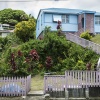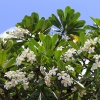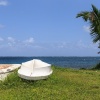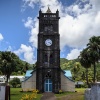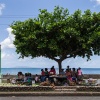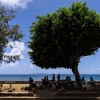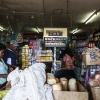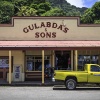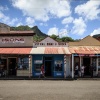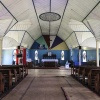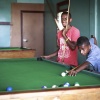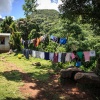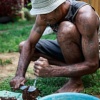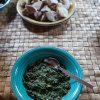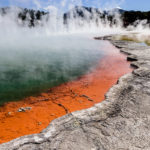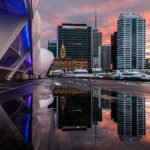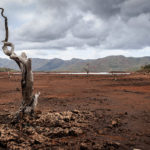Fiji – Melting Pot of the South Seas
Capital with Heart
As a colony Fiji was once part of the British Empire and of course that time left more behind than only sugar cane plantation and Indians harvesting it. Back then in colonial times Levuka, today’s regional centre of Ovalau Island, was capital to the entire Fiji archipelago and there are plenty of silent contemporary witnesses left, meaning the colonial style buildings along Levuka’s waterside promenade. Getting there is no problem as busses involving a ferry ride run between Fiji’s major cities. The sea is calm, so is the ferry ride and nothing reminds of the rough conditions when increasing cyclone “Ian” moved over East Fiji only a couple of days ago.
I spend the whole ferry ride with the captain on the bridge. Captain is a voluminous elder man who always knows where he’s at and whose lolling on the captain’s chair tells me that he’s not letting himself get worked up by my (photographical) presence. However his assistants react a little nervous and shy when they see my camera, in the way “Jeez, now the international press attends to what I am doing here!”
Solely the gay ship’s cook is everything but shy and makes eyes at me by already offering me a coffee having barely entered the bridge cabin. Originally the ferry must come from Japan or Korea, a funny story being told by countless English cheat stickers and captions being attached right next to almost any sign around.
After having arrived Levuka and found a hotel I get hungry and the charming ladies of the Whale’s Tale restaurant win my heart to stay their menu with meals like “Grilled Snapper in a light Kumquat Sauce and Rice” already sounds mouth-watering. The ladies are quite relaxed and point out that they don’t sell beer but that I can get it from the shop next door and may enjoy it in the restaurant. But then the food comes and it’s even better than words were describing it. As a chilli lover I asked the cook lady to kick it up a notch with fresh garlic and fresh chillies. Latter two ingredients are the cherry on the cake. If you ever make it to Ovalau’s Levuka then you have to visit the Whale’s Tale and I am very sure that the lovely ladies over there improved their already fantastic recipes a little.
Life on Ovalau is calm and tranquil bringing the local police already into the arena when strolling around at night with a tripod taking night shots. But everything’s relaxed as they are more curious than feeling like arresting someone. Before hunting a proper night photo we climb the mountain slope of outer Levuka. We, that is a cool German couple I met and I, get greeted everywhere we turn up and often those welcome addresses are accompanied by an invitation for a Kava session.
While strolling through the village we meet Paul, who gets at some coconuts with a machete. A smile is already enough to make Paul getting us a coconut as well. Knowing Paul for a couple of minutes only he takes us to his house, introduces his wife and four sons. Pure hospitality. In the next days he invites us to visit his little plantation.
What sounds like flat land is actually a growing area attached to the steep mountain slope towering the Levuka bay. There Paul cultivates his own Taro but also Kava, but the way up there is pretty steep and quite rich in vegetation as we walk through a line of lush banana and giant mango trees suffused with light meeting wild chilli bushes from time to time.
Later he invites us to join dinner, back down in his house; an offer that I instantly accept as those moments are the reason and essence of travelling to far away countries and experiencing other cultures. His wife cooks chopped Taro leafs in coconut milk, a very common and often eaten meal in Fiji and a vegetarian speciality. While eating the Taro leafs I feel my throat swelling and am quite happy to get to know after some time that even my hosts face the same fate and that this swelling and oppressive feeling in my throat decreases after some time. Phew!
Luckily the root of the Taro plant doesn’t cause any swelling. Consistency-wise it is similar to our potato and tastes like chips when being boiled and dredged with a little salt after. Its companion the Dalo root has however often the taste of literally nothing, but is very filling; already 2 cookie-like slices are enough to be full as a tick. Another really important plant in the life of the Melanesians is Kava, in other words the powder of its dried root, as it gets infused with water, then filtered and drank. That brew tastes like an earthy liquorice and narcotises the whole mouth, in particular the tongue, that powerfully as if your dentist would be up to some root end surgery.
Having soaked up impressions of an authentic hospitality and an open-minded way of approaching new people unfortunately I have to go back to Viti Levu again, by bus, then by ferry, back to Suva from where I continue my South Sea travel to New Caledonia.
